OCZ Vertex 3 (240GB) Review
by Anand Lal Shimpi on May 6, 2011 1:50 AM ESTRandom Read/Write Speed
The four corners of SSD performance are as follows: random read, random write, sequential read and sequential write speed. Random accesses are generally small in size, while sequential accesses tend to be larger and thus we have the four Iometer tests we use in all of our reviews.
Our first test writes 4KB in a completely random pattern over an 8GB space of the drive to simulate the sort of random access that you'd see on an OS drive (even this is more stressful than a normal desktop user would see). I perform three concurrent IOs and run the test for 3 minutes. The results reported are in average MB/s over the entire time. We use both standard pseudo randomly generated data for each write as well as fully random data to show you both the maximum and minimum performance offered by SandForce based drives in these tests. The average performance of SF drives will likely be somewhere in between the two values for each drive you see in the graphs. For an understanding of why this matters, read our original SandForce article.
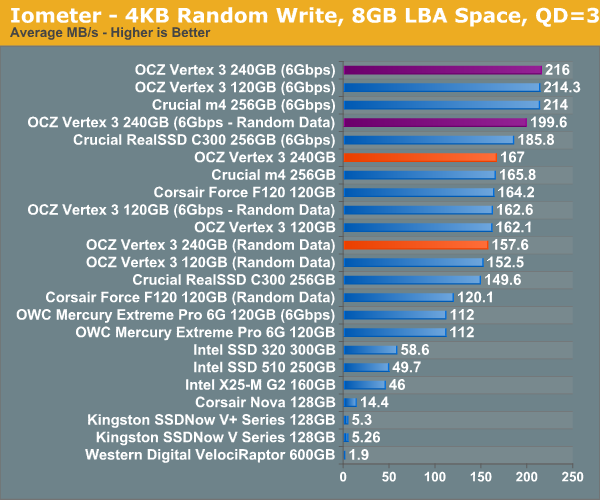
Many of you have asked for random write performance at higher queue depths. What I have below is our 4KB random write test performed at a queue depth of 32 instead of 3. While the vast majority of desktop usage models experience queue depths of 0 - 5, higher depths are possible in heavy I/O (and multi-user) workloads:
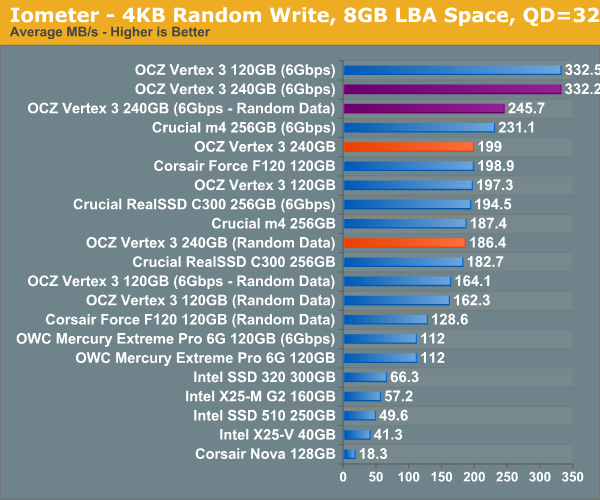
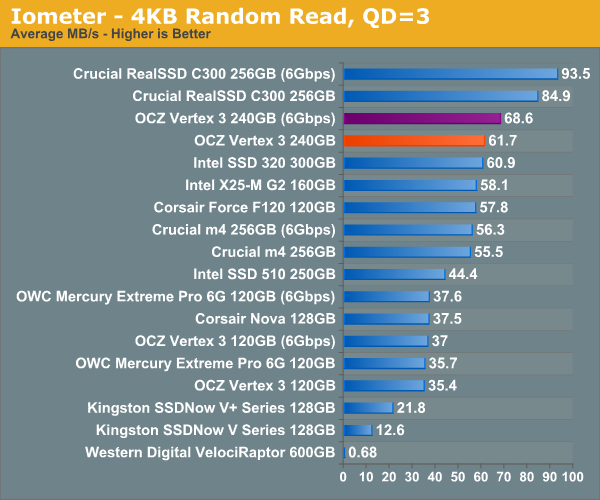
Sequential Read/Write Speed
To measure sequential performance I ran a 1 minute long 128KB sequential test over the entire span of the drive at a queue depth of 1. The results reported are in average MB/s over the entire test length.
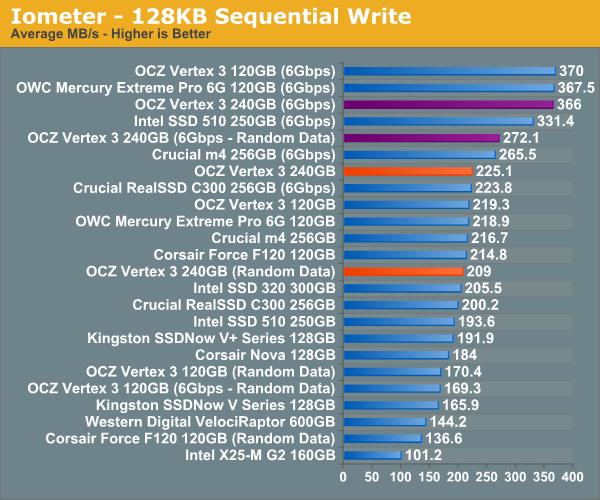
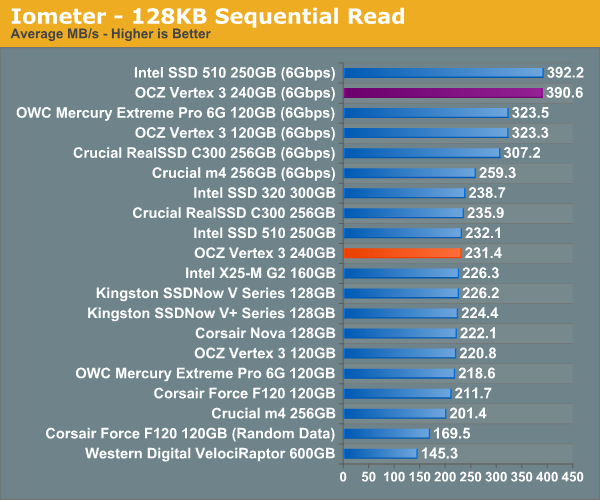










90 Comments
View All Comments
fowldogs - Friday, May 6, 2011 - link
Anand,I have recently researched which SSD to purchase and from several reviews, your's as well as many others, the OCZ Vertex 2 or 3 seemed like the best choice for performance. However, as I read consumer reviews on different shopping sight (Newegg, Amazon, etc), the Vertex 2 and 3 drives received numerous low reviews; including many that said the drive died on them soon after purchase.
Can you shed any light on this? Have you had any discussions with OCZ about their quality? I know that Mac's can be very finicky about SSD drives, but it seems many PC users were encountering problems too.
For now, I have decided on a Crucial drive, but I would like to know more about the quality issues of OCZ.
Omid.M - Friday, May 6, 2011 - link
If it's a ribbon cable issue for the 6 Gbps interface, then it would make the most sense to get the Intel 320 series SSD. Take a look on MacRumors about this drive versus Vertex 3 in the MBP, especially the 2011 models.Many more people are having good luck with Intel 320 than with Vertex 3. Sad.
Maybe someone should tweet and email OCZ about it, given how closely they seemed to be working with AnandTech to address reliability issues?
@moids
dagamer34 - Friday, May 6, 2011 - link
Always follow the law of reviews: no one actively thinks to leave a positive review, people always glamor for attention with negative reviews.darwinosx - Friday, May 6, 2011 - link
Yes but there is a critical mass of people with issues and much commonality among their complaints so that doesn't really work here.seapeople - Saturday, May 7, 2011 - link
Yes, but when Intel drives get 3% of 1-star ratings and the Vertex 2 gets 20% of 1-star ratings with numerous people claiming multiple RMA's, it makes you think there's a significant difference in reliability.Anand Lal Shimpi - Friday, May 6, 2011 - link
Perhaps a little background is in order :)Whenever I hear about a failure of any component from one of our readers (either via a comment, email, twitter, etc...), I forward it on to the manufacturer of the product. Usually this results in two things: 1) the AT reader getting taken care of a little quicker than normal, and 2) the manufacturer getting the faulty product back sooner so they can figure out what went wrong. I do this with all products but SSDs are the most common given the large amount of growing pains we've had there as an industry.
For a while there I was spending a lot of time talking to OCZ about failed Vertex 2s. Unfortunately I was traveling a lot at the start of it and didn't have time to pursue in great depth, but I alerted OCZ that there seemed to be a growing trend and asked for an explanation. Meanwhile I believe OCZ also saw the same trend, determined a root cause and addressed it.
OCZ has the problem of being a relatively small company competing amongst much larger ones in the SSD space. As a result there's pressure to scale production but it's near impossible to quickly scale without missing something and it seems like quality has suffered at distinct points in its history. Each time OCZ usually makes good by its customers, but it's still a risk associated with buying from a smaller company vs. an Intel for example. I do believe the trend is generally positive, I do expect the Vertex 3 to be more reliable and consistent than anything in OCZ's past - but for utmost reliability, Intel seems to have the best return rates in the industry for SSDs.
I have been meaning to check out OCZ's new manufacturing facilities which may give me some more insight into its investment in production and testing. I know on the validation side OCZ is leaps and bounds better than it was 2 years ago (I spent a lot of time discussing validation with OCZ back in the Vertex 1, Vertex 2 and Core days) but I'm not sure where they stand in terms of production.
The Mac problems I believe are separate. There's a problem with some (not all) MBPs and some SSDs but I can't figure out what. OWC seems to think that the problems on the 17-inch 2011 MBPs are related to EMI and Apple's quirky SATA cable - I suspect this may extend to all of the models, I honestly just haven't had the time to test it.
Take care,
Anand
darwinosx - Friday, May 6, 2011 - link
OWC is the one that made the false claims about OCZ ram specs (which you debunked) and they also sell a replacement cable. So I don't take anything they say very seriously. Weren't you the one who said manufacturers should ship to get things out even if they weren't quite ready? A post I strongly disagree with and is likely the cause of OCZ's troubles.cactusdog - Friday, May 6, 2011 - link
Its really a shame you get a big performance hit with the 120GB version. Its easy to see how the marketing works.....first release the fast 240Gb version, once the reviews are up, release the slower mainstream 120GB version and hope no one looks at the fine print.thornburg - Friday, May 6, 2011 - link
I realize that you're a big believer in the SandForce drives, but where are the reviews of other products?Is Intel the only one able to get any coverage?
Where are the reviews of the new Samsung SSDs?
NCM - Friday, May 6, 2011 - link
Somebody is sure in love with their 4-die NAND packages! Enough that the 480GB drive costs well over triple the price of the 240GB version, even though virtually everything but the NAND should be the same. I could see a 480GB SSD for a grand, but $1800? (Or a 320GB for $750.) That's silly money, and a self-fullfilling prophecy to boot: they don't sell because they're so expensive because there's no production volume.Anand, to repeat somebody else's request in one of your previous SSD reviews, could you please include a typical 5400 rpm laptop drive in your power consumption comparisons? (The Seagate Momentus XT 500 hybrid doesn't really count as typical.)